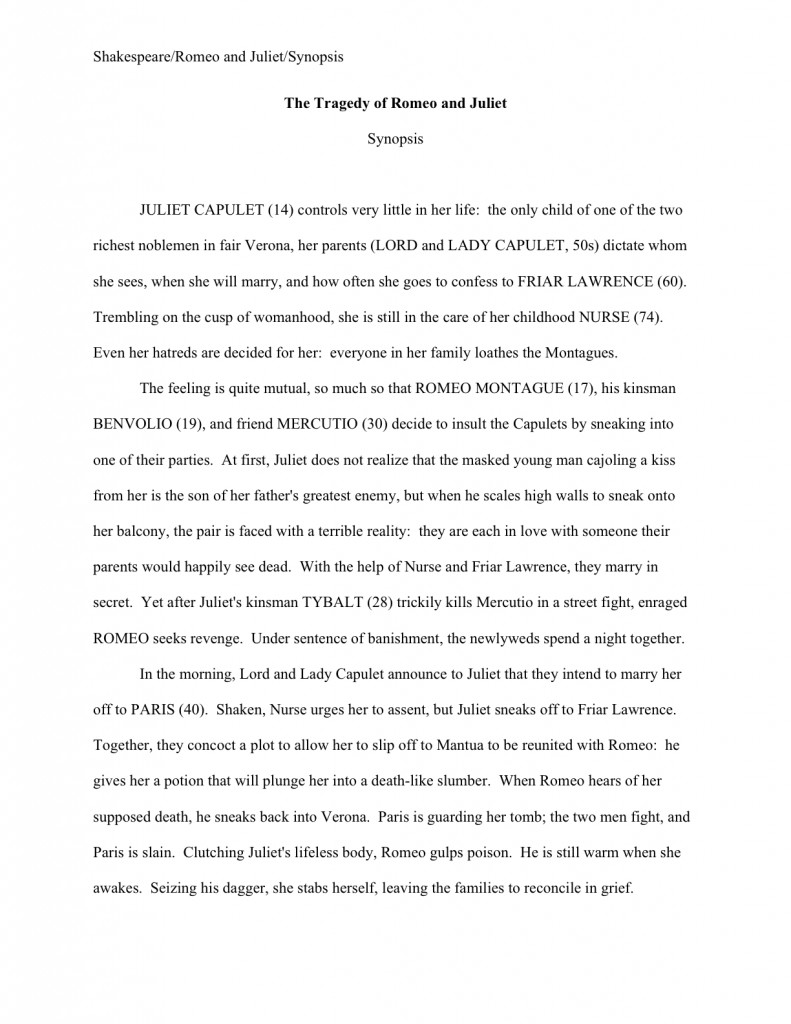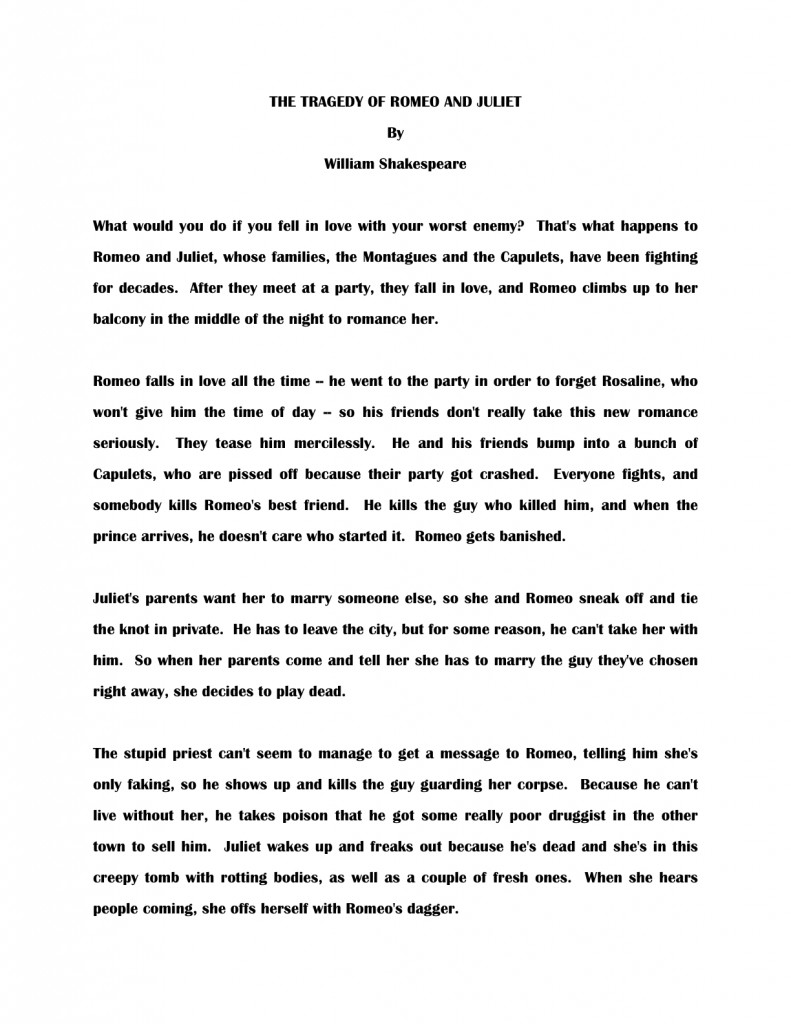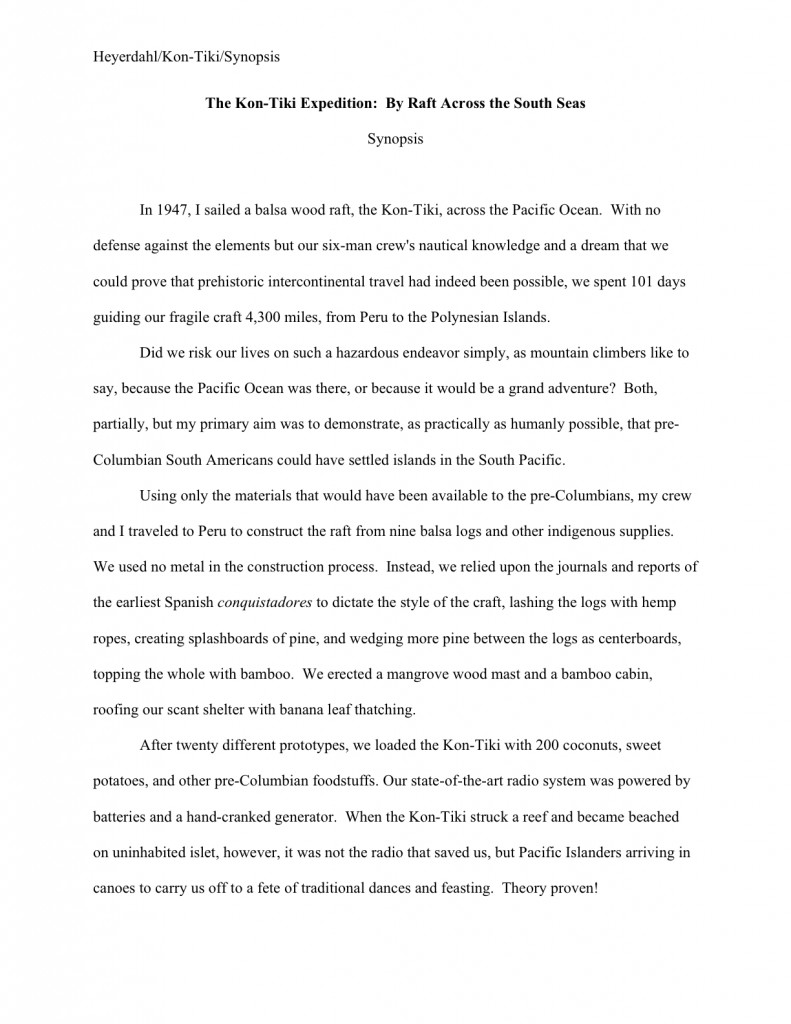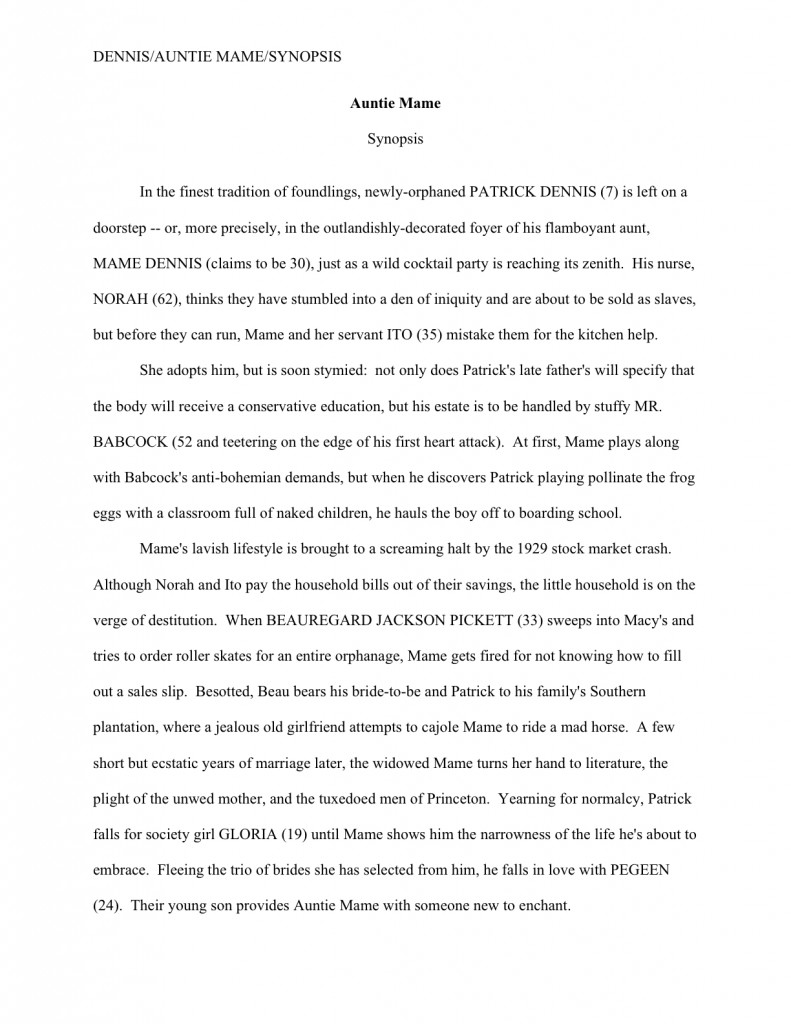


Answer: not a synopsis, necessarily. It’s only read sometimes.
That double-take you just did was well-justified. “You drive me to distraction, Anne,” many synopsizers cry, rending their garments. “Here we have been spending weeks on perfecting the darned thing, and now you’re raising the possibility that no one will read it? Just what kind of sick torture-fest are you running here?”
Now, now, I didn’t suggest that synopses are never read. Once you’re signed with an agent, s/he will undoubtedly read your synopsis of your next book.
Before that point, however, it’s a bit hit-and-miss. Although agents routinely ask submitters to send along a synopsis with requested manuscript pages, and agency guidelines frequently call for one to be tucked into a query packet, it’s seldom the first thing read. And if Millicent the agency screener has already decided yea or nay on a book project, why should she invest another minute or two in reading the attached synopsis?
You were doing further damage to your garments by the end of that last paragraph, weren’t you? “But Anne,” some of you protest through gritted teeth, “you just said yourself that they ask us to send the wretched things; it’s not as though any sane person would sit around tossing off synopses for pleasure. Why would they request a synopsis if they don’t intend to read it?”
Ah, but they do — at least, they intend to read some of them.
Allow me to explain before you rip that nice shirt any further. Let’s take the synopsis tucked into the query packet first. As most of us in the Author! Author! community know to our sorrow, it’s Millicent’s job to make up her mind pretty quickly about queries. As in under 30 seconds a piece.
Before you get your hackles up about all of your hard work on your query receiving that little scrutiny, do the math. If the average agency receives somewhere between 800 and 1500 queries per week — or more, if it has a compelling website featuring an easy-to-fill-out submission form that allows a querier to bypass the tedium of writing a query letter — and each takes 30 seconds to open and read, that’s between 6.5 and 12.5 hours of agency time just to read them. And that’s not counting all of the additional hours to read requested materials.
If that doesn’t seem like a huge time investment to you, consider this: agencies do not make any money off reading queries at all; they make money by selling the work of their already-signed clients. Oh, they might see some cash from taking on any writer in today’s query pile, but that’s going to take time.
And that, in case any of you have been wondering, is why many agencies do not accept queries at all. Instead of investing in at least a half-time employee to screen queries, they obtain new clients through recommendations from current clients, or by blandishing authors unhappy with their agents into switching.
Back to Millicent’s comparatively writer-friendly agency. Let’s say that the agency in question calls for a 1-page synopsis to be included in every query packet. If she read all of them in their entirety, even assuming that each took her only an additional minute, that would raise the agency’s investment in query processing to 20 to 37.5 hours per week.
Or, to put it another way, a half- or full-time employee. Given the additional cost, what do you think the probability is that a newly-trained Millicent will be directed to give every query synopsis submitted a thorough once-over?
Uh-huh. Depressing, but logistically necessary, I’m afraid.
So how will she decide which to read and which to skip? The ones that are not professionally formatted would be the obvious ones to pass by, as would those whose query letters prompted a rejection. If Millie’s already decided to give the project a pass, she doesn’t need to spend any more time on the query packet, right?
By the same token, she doesn’t have a tremendous amount of incentive to take the time to peruse the synopses accompanying queries that immediately caught her interest. If she already knows that she wants to see the manuscript, why spend the extra minute on the synopsis?
So which ones virtually always get read? The ones where she’s on the fence about requesting pages — which means that the synopsis is a very, very important writing sample.
Not clear on why? Okay, here are two different 1-page synopses — and continuing my trend of summarizing works in the public domain, I’ve tackled ROMEO AND JULIET. Again, if you are having trouble reading any of these examples, try double-clicking on the image and either enlarging it in a new window or downloading it to your desktop. (Also again: if I find out that anyone is lifting any part of what follows and turning it in to a freshman English teacher, noggins will be rapped mercilessly.)
Wiggle your tootsies into Millicent’s moccasins, and tell me which is more likely to induce her to tumble down on the by gum, I’d like to see this manuscript side of the fence, and which would send her reaching for the stack of form-letter rejections:

Or:

Both summarize the plot in a single page, but there’s really no contest here, is there? (If there was any hesitation at all about your shout of “YES!” or if you’re perplexed about why the bad example does not have indented paragraphs and the good example does, please rush with all possible dispatch to the SYNOPSIS ILLUSTRATED and HOW TO FORMAT A MANUSCRIPT categories on the archive list at the bottom right-hand side of this page. Millicent probably would not read even a line of this one.)
I’m going to level with you here: on any given day, a Millicent working at an agency that expects synopses to be included in a query packet would see many, many more of the second type than the first. It makes her job significantly easier and speedier, of course, because she barely would have to glance at the second in order to decide to reject it. Yet setting aside the obvious formatting and presentation problems — everyone caught the lack of slug line, block-justified paragraphs, and insane typeface choice, right?— what else would strike Millicent as less professional about the second example if she did go ahead and read it?
How about the fact that it’s terribly vague? Compared with the first example, it’s stuffed to the gills with generalities — and that makes this story downright hard to follow. The first example contains summary statements, but because they are grounded in specifics, Millicent will be able to follow what is going on with ease,
Also, who are the characters here? This guy is not an adequate character-identifying phrase. Where does this story take place? What century is it? Why are these people using poison and daggers instead of guns?
And so forth. My point is, Millicent’s assumption that the unprofessional formatting was representative of the polish of the synopsis in general would have been accurate in this instance. Just something to ponder the next time you find yourself resenting how quickly the average query packet gets screened.
Another factor that Millie is going to work into her yea-or-nay decision on the query packet is whether the manuscript in question seems to be a good fit for her agency. The descriptive paragraph in the query letter may not have given her a clear enough sense of what the book is about. And frankly, if the query letter did not include the book category — and a good 90% do not, despite my years of griping here on the subject — she may need to read the synopsis to figure out what kind of book it is.
Which provides me with a perfectly glorious segue into demonstrating a couple of matters I touched upon briefly earlier in this series. As I devoutly hope those of you who have been paying close attention recall,
(a) regardless of the tense of the manuscript, the synopsis should be in the present tense, and
(b) even if the manuscript is written in the first person, the synopsis should be written in the third person, UNLESS
(c) the manuscript being synopsized is a memoir, in which case the synopsis should be written in the past tense and the first person.
Everyone clear on that? I see most of you nodding, but so that the notion that one or two of you might find this somewhat convoluted rule a trifle confusing won’t keep me up fretting in the dead of night, I’ve come up with a couple of concrete examples. First, let’s take a gander at a synopsis for one of the best-selling memoirs of the 20th century:

It only makes sense for the author (well, not the author — me, but play along with my conceit here) to synopsize his work in these terms, right? He’s describing something that happened to him, a story that only he could tell. In fact, a large part of his platform is that only he and five other people could possibly give a first-person account of this remarkable voyage.
As an interesting contrast, let’s now look at the synopsis for a novel that’s written as though it were a memoir: in the first person and as if the author were actually the titular woman’s nephew.

See how the use of the proper tense and voice for a fiction synopsis renders it instantly plain that this book is a novel, not a memoir? If the query letter fell into the oh-so-common traps of not mentioning whether the book is fiction or nonfiction (you’d be astonished at how common that is) or mentioning up front that it’s based on real events, Millicent could know right away from the synopsis into which book category it should fall.
Everyone with me so far? This is counter-intuitive stuff.
Oh, and in answer to what a panicked few observant souls out there just thought very loudly: yes, the slug line in that last example was entirely in capital letters; some writers prefer to do it that way. Use either that looks best to you, but be consistent between the synopsis and the manuscript.
Speaking of manuscripts, while the query synopsis is intended to prompt Millicent to ask to see the manuscript, a synopsis tucked into a submission packet of requested materials serves a slightly different purpose — or rather, a couple of different purposes, potentially. Which of those purposes is operative determines how likely the synopsis is to get read.
Again, the crucial factor here is saving time. If a synopsis accompanies a partial manuscript, Millicent will seldom read it before scanning the requested pages of the book. Why? Well, if the opening pages don’t grab her, she’s going to reject the submission, right? So why would she invest several minutes in perusing a synopsis for a manuscript she’s already decided to reject?
By the same token, it’s not necessarily in her interest to read it if she likes the partial manuscript. Oh, she might be curious about what happens next, but isn’t far and away the best way to find out to request the rest of the manuscript?
Generally speaking, the shorter the number of requested pages — and this applies equally well to query packets for agencies that ask for a writing sample up front, by the way — the more likely Millicent is to read the submission synopsis.
Do I sense some head-scratching out there? “But Anne, a lot of agents ask for a synopsis even when they request the entire manuscript. But by the logic above, why would Millicent bother to read the synopsis when she has the whole shebang in front of her?”
Good question, head-scratchers: often, she won’t. But her boss might want to take a gander at it before reading the manuscript herself, and she certainly would want to have that synopsis on hand when she picks up the phone or sits down and writes an e-mail to an editor about your work.
Who’d have thought that something so annoying could be so beneficial down the line? Polishing your synopsis is not only good short-term marketing strategy, but an excellent long-term investment in your writing career.
You are in this for the long haul, aren’t you? This isn’t the only book you’re ever planning to write, is it?
Kudos to you for knuckling down and learning this challenging-but-essential writerly skill. When you’re effortlessly tossing off the synopsis for your eighth book while your agent eagerly waits for it, you’ll be awfully glad you took the time now.
Speaking of things you might want to get a head start upon, next week, I shall be guiding all of you through the mysteries of the author bio. Increasingly, agencies are requesting these in submission packets, and even in query packets — and even if the agent of your dreams doesn’t ask you for yours until your manuscript is ready to head out the door to editors, you’ll be much, much happier if you don’t try to crank it out at the last minute. Like a well-crafted synopsis, it benefits from advance thought.
My, I have high expectations for you, don’t I? The agent you deserve will as well. Take it as a compliment to your talent — and the seriousness with which you have chosen to develop it.
Keep up the good work!